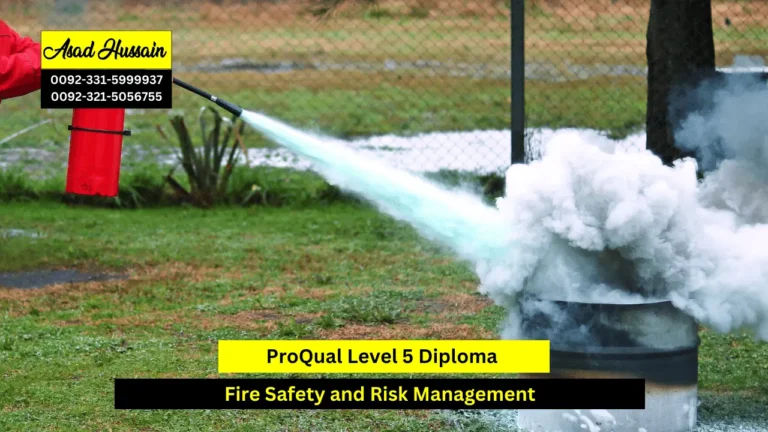Agriculture, often referred to as the backbone of society, has been evolving with the help of technology, innovation, and engineering. One area of particular importance is agricultural engineering, which combines agricultural practices with engineering principles to improve farming systems, machinery, and sustainability. As agriculture becomes increasingly dependent on advanced technology, the need for skilled professionals in agricultural engineering has never been greater.
The ICTQual Level 5 Diploma in Agricultural Engineering is an advanced qualification aimed at individuals who wish to specialize in the engineering side of agriculture. This qualification is recognized at a higher level within the qualifications framework, signaling that graduates are well-equipped to tackle complex challenges in the agricultural engineering sector.
The ICTQual Level 5 Diploma in Agricultural Engineering is a comprehensive program that provides students with the technical expertise and practical experience needed to excel in the agricultural engineering industry. Over two years, students will gain 240 credits and a deep understanding of the principles and practices that drive modern agricultural systems.
Program Highlights
Year 1:
- Introduction to Agricultural Engineering Principles
- Applied Mechanics in Agriculture
- Agricultural Machinery and Equipment
- Hydraulics and Pneumatics in Agriculture
- Soil and Water Management Systems
- Electrical and Electronic Systems in Agriculture
- Introduction to Agricultural Structures
- Sustainable Farming Technologies
- Basic Agricultural Safety Practices
- Crop and Livestock Machinery
- Mechanical Design and CAD for Agricultural Engineering
- Introduction to Farm Management
Year 2:
- Advanced Agricultural Engineering Principles
- Renewable Energy Applications in Agriculture
- Advanced Irrigation and Water Management Systems
- Precision Agriculture Technologies
- Farm Mechanization and Automation
- Agricultural Environmental Engineering
- Maintenance and Repair of Agricultural Machinery
- Agricultural Engineering Project Management
- Agricultural Engineering Systems Integration
- Sustainable Farm Design and Layout
- Business and Entrepreneurship in Agricultural Engineering
- Research and Development in Agricultural Engineering
To enroll in the ICTQual Level 5 Diploma in Chemical Engineering (240 Credits – 2 Years), candidates must meet the following entry requirements:
- Educational Qualifications: Applicants should hold a Level 4 qualification, such as a diploma, certificate, or equivalent, in a relevant field. A background in subjects like chemistry, physics, mathematics, or engineering is highly recommended, as the course builds upon these foundational concepts in chemical engineering.
- Age Requirement: Candidates must be at least 18 years old to ensure they are prepared to manage the academic and practical demands of the program.
- English Proficiency: Strong proficiency in English is required, as students must engage with technical terminology, complete written assignments, and communicate effectively in the chemical engineering field.
- Technical Skills: Basic computer skills are necessary, as the program includes assignments, simulations, and the use of engineering software for process design and analysis.
- Relevant Experience (Optional): While not required, prior experience with chemical engineering concepts, laboratory work, or industrial processes can be beneficial, enhancing understanding and performance throughout the course.
Learning Outcomes for the Level 5 Diploma in Agriculture Engineering 240 Credits – Two Years:
Year 1:
1. Introduction to Agricultural Engineering Principles
- Understand the core principles of agricultural engineering.
- Recognize the importance of engineering in modern farming practices.
- Apply fundamental engineering concepts to agricultural systems.
2. Applied Mechanics in Agriculture
- Demonstrate knowledge of mechanical principles in agriculture.
- Apply concepts of force, motion, and mechanics to agricultural machinery.
- Solve basic mechanical problems related to farming equipment.
3. Agricultural Machinery and Equipment
- Identify and describe various types of agricultural machinery.
- Understand the operation, maintenance, and troubleshooting of farming equipment.
- Select the appropriate machinery for specific agricultural tasks.
4. Hydraulics and Pneumatics in Agriculture
- Understand the principles of hydraulics and pneumatics in agricultural systems.
- Apply hydraulic and pneumatic systems in agricultural machinery.
- Troubleshoot common issues in hydraulic and pneumatic systems.
5. Soil and Water Management Systems
- Explain the relationship between soil, water, and agricultural productivity.
- Apply efficient soil and water management practices.
- Design simple irrigation and drainage systems for sustainable farming.
6. Electrical and Electronic Systems in Agriculture
- Understand the role of electrical and electronic systems in agriculture.
- Apply basic electrical principles to agricultural equipment.
- Troubleshoot common electrical issues in farming machinery.
7. Introduction to Agricultural Structures
- Understand the principles behind the design and construction of agricultural buildings.
- Identify different types of agricultural structures and their uses.
- Learn the basics of structural safety and sustainability in farming environments.
8. Sustainable Farming Technologies
- Recognize the importance of sustainability in agriculture.
- Apply engineering solutions that improve resource efficiency and reduce environmental impact.
- Explore renewable energy technologies used in farming.
9. Basic Agricultural Safety Practices
- Identify potential hazards in agricultural environments.
- Understand health and safety practices specific to agricultural engineering.
- Implement safe practices for operating and maintaining machinery.
10. Crop and Livestock Machinery
- Identify and understand the function of machinery used in crop and livestock production.
- Apply operational knowledge to the effective use of these machines.
- Troubleshoot and maintain crop and livestock machinery.
11. Mechanical Design and CAD for Agricultural Engineering
- Apply mechanical design principles to agricultural engineering projects.
- Use computer-aided design (CAD) tools to create engineering designs for agricultural machinery.
- Develop prototypes based on CAD designs.
12. Introduction to Farm Management
- Understand the basics of farm management and agricultural operations.
- Apply concepts of resource planning, budgeting, and farm optimization.
- Recognize the role of engineering in improving farm efficiency.
Year 2:
13. Advanced Agricultural Engineering Principles
- Deepen understanding of engineering principles applied to agriculture.
- Solve complex engineering problems in agricultural systems.
- Apply advanced concepts in mechanics, thermodynamics, and materials science.
14. Renewable Energy Applications in Agriculture
- Understand the use of renewable energy sources in agricultural operations.
- Design systems that integrate solar, wind, and biomass energy into farming.
- Evaluate the cost and environmental benefits of renewable energy solutions.
15. Advanced Irrigation and Water Management Systems
- Design and implement advanced irrigation systems.
- Use modern technologies to optimize water usage on farms.
- Address challenges related to water management and conservation.
16. Precision Agriculture Technologies
- Apply GPS, remote sensing, and data analytics to optimize agricultural production.
- Understand how precision farming technologies improve efficiency and yield.
- Implement precision agriculture solutions to reduce costs and increase sustainability.
17. Farm Mechanization and Automation
- Explore the integration of automation in agricultural machinery.
- Understand the role of robotics and autonomous systems in modern farming.
- Apply mechanization to improve farm productivity and reduce labor costs.
18. Agricultural Environmental Engineering
- Identify environmental challenges in agriculture.
- Develop engineering solutions to minimize environmental impacts such as soil erosion, waste, and pollution.
- Apply sustainable engineering practices to farming systems.
19. Maintenance and Repair of Agricultural Machinery
- Develop skills to maintain and repair agricultural machinery and equipment.
- Diagnose mechanical issues and implement effective repair solutions.
- Understand the importance of regular maintenance for equipment longevity.
20. Agricultural Engineering Project Management
- Understand project management principles as applied to agricultural engineering projects.
- Plan, execute, and manage agricultural engineering projects from start to finish.
- Apply budgeting, scheduling, and resource management techniques.
21. Agricultural Engineering Systems Integration
- Integrate various agricultural engineering systems (machinery, irrigation, automation) into cohesive systems.
- Solve integration challenges in farm engineering.
- Ensure that all systems work together efficiently to optimize farm performance.
22. Sustainable Farm Design and Layout
- Design farms with sustainability in mind, optimizing land use and resource efficiency.
- Implement engineering solutions for sustainable farm layout and operation.
- Understand the environmental impact of farm design and how to mitigate it.
23. Business and Entrepreneurship in Agricultural Engineering
- Develop entrepreneurial skills for launching and managing agricultural engineering businesses.
- Understand the market dynamics of agricultural technologies.
- Create business plans for innovative engineering solutions in agriculture.
24. Research and Development in Agricultural Engineering
- Conduct research to address current challenges in agricultural engineering.
- Develop innovative solutions for improving agricultural practices.
- Stay updated on the latest trends and technological advancements in the field.
The ICTQual Level 5 Diploma in Agricultural Engineering (240 Credits – Two Years) is designed for individuals who are passionate about combining engineering principles with agricultural practices. This course is ideal for:
- Aspiring Agricultural Engineers: Individuals looking to specialize in agricultural engineering, focusing on the design, maintenance, and optimization of agricultural machinery and systems.
- Technically-Inclined Individuals: Those with a background in engineering, technology, or other technical disciplines who are seeking to apply their knowledge to the agricultural sector.
- Career Changers: People with experience in mechanics, engineering, or agriculture who want to transition into agricultural engineering and enhance their career prospects within this field.
- Professionals Seeking Advancement: Those already working in agriculture or related industries who wish to deepen their knowledge, acquire advanced technical skills, and move into higher-level roles.
- Technology Enthusiasts: Individuals interested in applying emerging technologies, such as automation, robotics, and IoT, to improve agricultural practices and sustainability.
- Environmental Advocates: People passionate about sustainable farming and looking to gain the expertise to design systems that reduce environmental impact while increasing efficiency.







